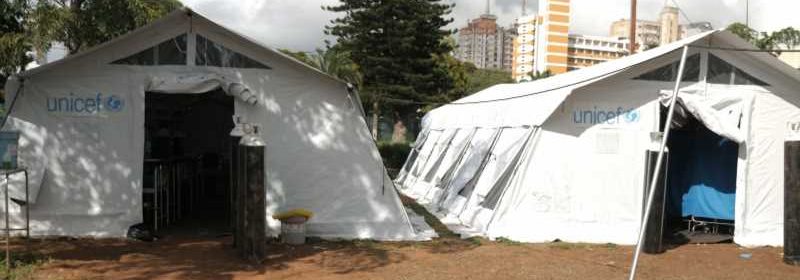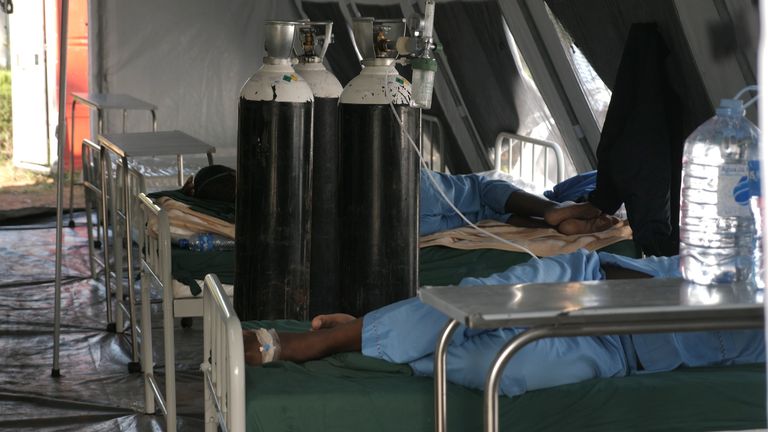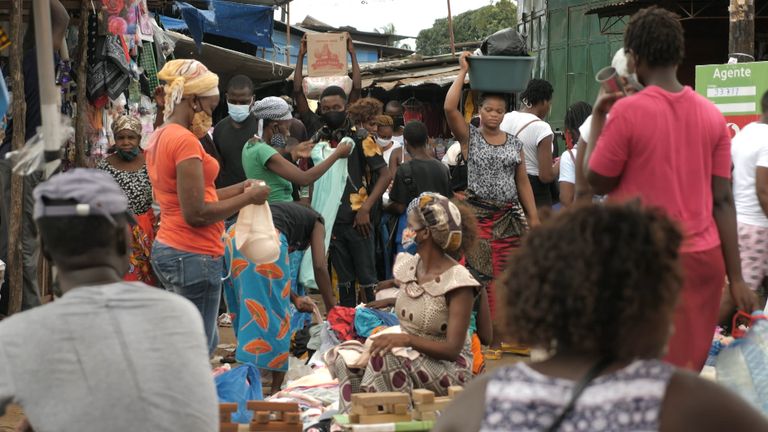COVID-19: Mozambique’s fight against ever-rising COVID infections – and a ‘five-year wait’ for vaccines

Hard-pressed hospital staff in Mozambique are not only fighting a sevenfold increase in COVID cases, but they have no functioning track-and-trace system, a lack of cost-free testing, and a rising tide of the South African variant.
The biggest hospital in Maputo is also the busiest health facility in Mozambique.
It is called the Hospital Central de Maputo and it has occupied a sprawling site in the centre of this ramshackle capital for well over a century.
Live COVID updates from UK and around the world
Thousands of people go to “Central” every day looking for treatment.
There are not enough seats in the outside waiting area and the roads and pavements surrounding the main buildings provide additional accommodation for those looking for care.
But the global pandemic has now arrived in this African hub, and it has put Hospital Central under extraordinary strain.
We met with Dr Lucia Chambal who specialises in internal medicine but now coordinates the hospital’s response to COVID-19.
It is 14-hour-a-day job, she says.
“The first wave was not so bad, we didn’t have so many deaths but this second wave, it is getting hard for us.”
At the beginning of January, Hospital Central reserved 14 beds for COVID-19 patients.
Five weeks later they have created 140 beds, many of which have been fashioned for a series of donated tents now sitting on the grounds – but that is still not enough.
Dr Chambal pointed at a large white tent with semi-circular roof that looked like it might have been deployed at outdoor weddings in its former existence.
“We are working on this big tent to add more patients here. We are going to have 25 patients here.”
“When are you going to get that up and running?” I asked.
“This week. They are just working on the floor and it will be done.”
The rate of infection in Mozambique has shot upwards – with case numbers standing seven times higher than at the peak of the first wave last September.
In total, 47,000 people have caught the virus with 486 fatalities, but most people have little faith in the official numbers.
In fact, it is very difficult to know how badly Mozambique has been hit.
There are only four places in Maputo offering cost-free COVID tests and only one laboratory in the city to process the results.
There is no track-and-trace system to monitor those who are infected and hospital admissions are reserved for the most serious cases – the vast majority are told to isolate at home.
Hard-pressed staff at hospitals like the “Central” have to deal with the consequences.
We entered one of the COVID tents and met a man called Able Zavala, who was wearing a plastic mask connected to a giant tank of oxygen.
He said he was happy to speak but we could see that he was struggling to fill his lungs.
“It is very scary and dangerous too – there are a lot of people outside and I believe they will come in here, it is very scary.”
Mr Zavala said everything changed in December, when Mozambican workers and tourists crossed the border from South Africa for the holidays, bringing gifts, supplies and the South African variant – otherwise known as B.1.351.
“It’s only that South African, many people coming to Mozambique for holidays so (the rate of infection) climbed like this… I want to get a vaccine before all of Mozambique is dying from this thing.”
It seems unlikely that the spread of the variant, which has been present in the country since last November, will be halted.
The Mozambican president has implemented new restrictions, including a night-time curfew and a prohibition on private events (except weddings) but basic measures are impractical in this impoverished nation of 30 million.
At Maputo’s Xiquelene market, we found of hundreds of people buying, selling – and earning what they need to get through the day. There was little social distancing and the majority were not wearing masks.
I spoke to one shopper called Amelia Cossa.
“We don’t have enough money to stay at home so I need to come here.”
“What would happen if you stayed home?” I asked.
“If we stay at home, we (go) hungry…. yes we are scared of COVID, but we are also scared of (going) hungry.”
Crucially, the introduction of first-generation vaccines will not provide a solution – or salvation – in a country like Mozambique.
I asked Flávio Ismael, projects coordinator at a prominent public health charity called Dream Sant’egidio, and asked him whether anyone has had a vaccine in Mozambique.
“No, we have heard about some embassies, foreign embassies that have received some vaccines but for the Mozambican people they are not available.”
The country’s leaders have signed up to the COVAX initiative, which aims to manufacture and supply vaccines for 20% of the population by the end of 2021.
However, Mr Ismael says it would take years to roll out an effective, nationwide programme here.
“How long will it take to vaccinate every Mozambican?” I asked.
“That would be a very difficult issue, many people (in Mozambique) do not have (identity) documents, it would be very difficult to vaccinate the right people,” he said.
“If a decision was made to vaccinate everyone, regardless of documents, then how long would it take?”
“At least three to five years to arrive: a long time,” replied Mr Ismael.
“Take into consideration that you can have people living 50km from Maputo but never, not for 50 years, have arrived in Maputo and won’t come just to vaccinate.”
The implications of Mr Ismael’s observations, gleaned from extensive experience running clinics offering treatment for HIV and non-communicable diseases, should be carefully considered.
An extensive, nationwide vaccine programme would take years and could prove pointless if the virus continues to develop new, highly contagious strains.
Regardless, people like Dr Lucia Chambal and her team will continue to do their best with donated tents, inexperienced staff and oxygen trucked in from South Africa.
And their best is everything they have.
Source: Read Full Article




